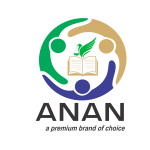Association of National Accountants of Nigeria (ANAN)
Association of National Accountants of Nigeria is the only chartered professional accountancy body in Nigeria empowered by law to teach as well as examine all its students. Besides, it is the only body having the absolute power to advance the science of accountancy.The Association was formed on 1st January, 1979, incorporated on 28th September, 1983 and was finally chartered by Decree 76 of 1993 on 25th August, 1993. The Association is a truly national accountancy body with education and training programme reflecting the national environment which would meet internationally accepted accounting standards. It was born out of a burden shared by a number of well meaning Nigerians for a home grown and home spun professional body. It sought a thoroughly Nigerian and community based approach to the definition of accountancy standards and practices.
Our Vision To make ANAN a Premium Brand of Choice in Professional Accounting Practice in Nigeria, and to impact on accounting education and practice in a profound and comprehensive manner. Our Mission To advance the Science of Accountancy in Nigeria, pioneering a multi-disciplinary emphasis in the production of well rounded, well blended, and well-honed professionals, profound in knowledge, skillful in practice, and ethical in conduct.
How to become a member?
All accountancy graduates with B.Sc. and HND from Nigerian Universities and Polytechnics, are eligible to commence a three-year training programme to qualify with the Association and earn the designation Certified National Accountant (CNA).This is similar to the system adopted by the Institute of Chartered Accountants of Scotland (ICAS). The Association also accepts specific overseas professional qualifications which are recognized under ANAN Act 76 (formally Decree No. 76) of 1993 Schedule 4.
All students aspiring to become members of the Association must attend the Nigerian College of Accountancy, Jos in preparation for the Association’s examination programme, consisting of FIVE PAPERS at Professional Examinations ‘A1 (PEA) and SIX PAPERS at Professional Examination ‘B1 (PEB) details of which are contained in the later Section Of this brochure.
Education & Training
The Council of the Association believes that the economic future of Nigeria depends largely on the commercial and industrial efficiency of its productive capacity. Therefore, the education and training of professional accountants should reflect the economic, structural and ideological environment of Nigeria. The Council, in an attempt to maintain internationally acceptable education and training standards has decided to follow the system of education and training similar to those of legal and medical professions. Accordingly, holders of B.Sc. and HND in accountancy from approved Nigerian Universities, Polytechnics, are required to attend the Nigerian College of Accountancy for nine months and pass the prescribed professional examinations.In the light of the foregoing, the Council has been able to distinguish between education and training.
Education:
Education is regarded as a generic and organic process involving a series of activities aimed at enabling an individual to assimilate and develop knowledge, skills, competencies and values that are not simply related to a narrow field of activity. Thus education allows broad range of problems to be defined, analysed and solved.
Training:
Training on the other hand, is the planned and systematic effort to modify or develop knowledge, skill and attitude through a learning experience in order to achieve effective performance in an activity or narrow range of activity. It is mechanistic, very precise and job oriented and produces observable effects in the short term. Operatives are trained.Executives are educated. Ideally, therefore, professional accountants of the 21st Century should be both educated and trained. Pursuant to the foregoing definitions of education and training, ANAN adopted from inception a straight forward approach which incorporates three basic ingredients, namely:
• a four-year period of study of accountancy in an institution accredited by the National Universities Commission (NUC) or National Board for Technical Education (NBTE); this is the basic entry requirement into the NIGERIAN COLLEGE OF ACCOUNTANCY (NCA)
• a one year of intensive professional education, training and examination at the Nigerian College of Accountancy.
• a two-year period of supervised practical experience as Accountant-in-Training (AIT) in any sector of the economy. Items (b) and (c) above satisfy the three year professional training for membership of the Association.
